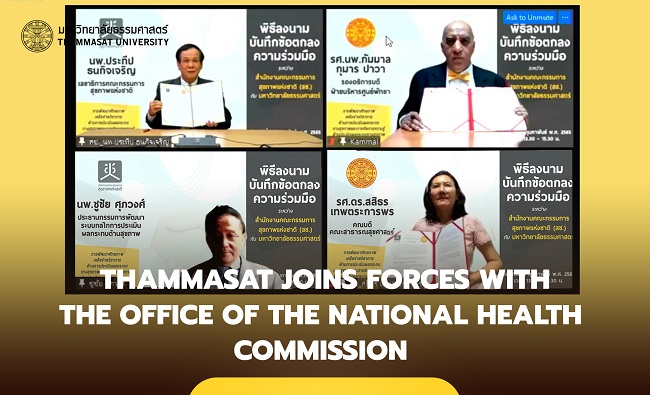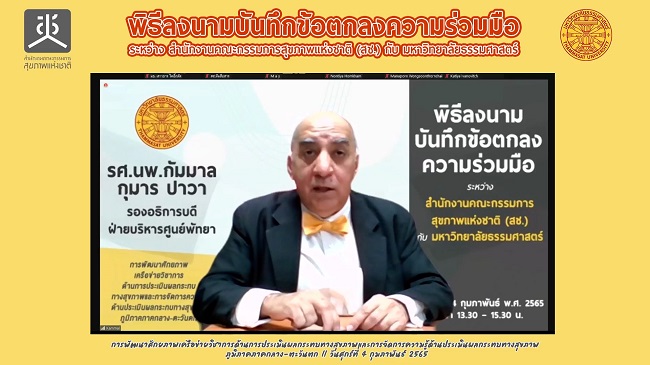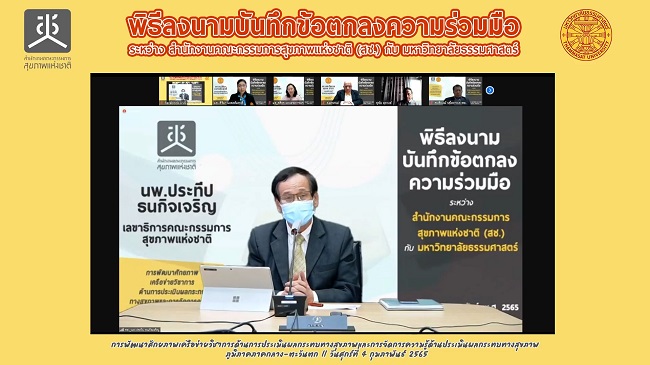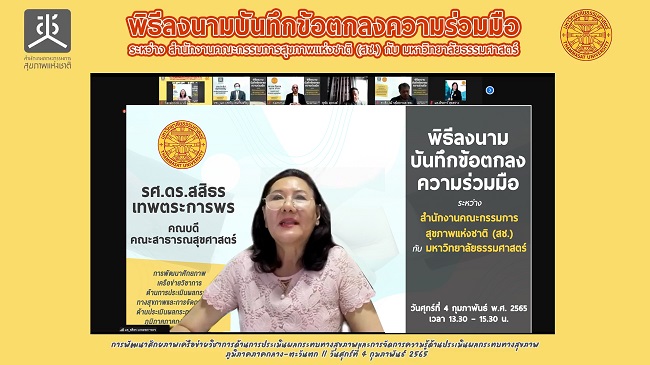Thammasat joins forces with the Office of the National Health Commission, fostering HIA academics
Thammasat University and the board members of the National Health Commission Office (NHCO) signed a MOU on academic cooperation.
Monday 7 February 2022

Thammasat University and the board members of the National Health Commission Office (NHCO) jointly signed a memorandum of understanding on academic cooperation towards developing the potential of academic networks in health impact assessment and knowledge management in Health Impact Assessment in the Central-Western Region. There is a scope for cooperation in human resource development, research, and knowledge that will support and promote the implementation of the Health Impact Assessment (HIA) process.

Assoc. Prof. Kammal Kumar Pawa, M.D., Vice Rector for Administration (Pattaya Campus), Thammasat University said that Thailand had major improvements in the public health system when the National Health Security Office (NHSO), Thai Health Promotion Foundation (ThaiHealth), and the National Health Commission Office (NHCO) were established. These three organizations are regarded as the key leaders in driving and developing the country's health system which is a progress that is consistent with Thammasat University’s philosophy in doing for the people.

Dr. Prateep Thanakijcharoen, secretary-general of the National Health Commission, revealed that health is an important issue related to economic and social dimensions, especially in the time of the COVID-19 pandemic crisis that makes it clear to us the connection between health, economy and society. As Thailand needs sustainable development that is healthy and environmentally friendly therefore, HIA is considered an academic tool to support sustainable development and will lead to the reduction of conflicts Minimize the confrontation of all parties involved.
Dr. Prateep said that the importance of Thammasat University in the development of HIA besides its role in production and development of manpower potential. It also serves in terms of research and development of the body of knowledge that will determine the development in the area, while the role of the NHCO and strategic partners will play a role in formulating HIA rules and guidelines, supporting the development of academics and manpower through the mechanism of the HIA Consortium, including communication and social movement to recognize and take advantage of HIA tools.

Assoc. Prof. Dr. Sasithon Taptagaporn, Dean of the Faculty of Public Health, Thammasat University said that in this cooperation agreement there is a clear scope of work, such as supporting personnel who are experts in organizing HIA training both short-term and long-term, relating to courses offered at the Faculty, supporting research work and knowledge development in HIA, both from the student's thesis and from research by academics from educational institutions that are networked in the region, including 16 institutions and 18 faculties.
In addition, there is also a network comprising the Local Government Organization and the Public Health Area Committee, which will represent the people's sectors in District 4 and 5. All these networks will have contribute to the development of HIA knowledge-sets, including collaborative knowledge management and promoting the adoption of the HIA process as a tool for developing Healthy Public Policy with the NHCO as a mentor and continually support the operation in order to raise the level and increase the potential of creating a body of knowledge, research results and innovation, together with the faculty that will be established as an academic center on HIA in the future.